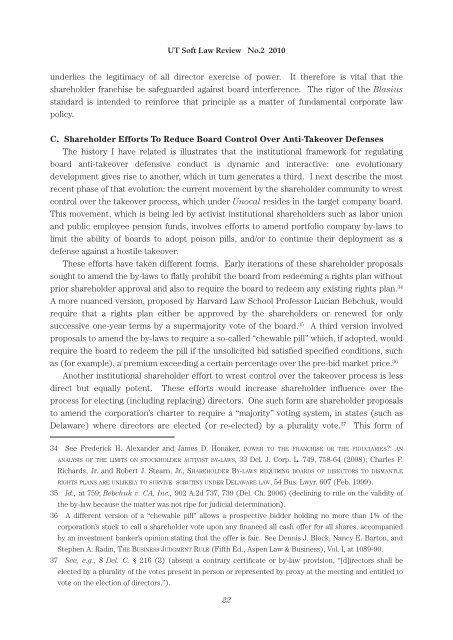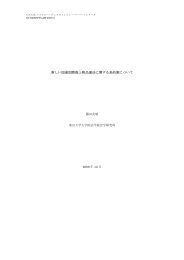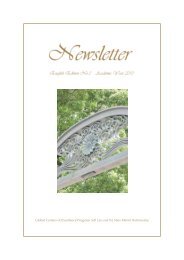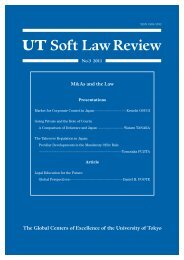UT Soft Law Review
UT Soft Law Review
UT Soft Law Review
Create successful ePaper yourself
Turn your PDF publications into a flip-book with our unique Google optimized e-Paper software.
<strong>UT</strong> <strong>Soft</strong> <strong>Law</strong> <strong>Review</strong> No.2 2010underlies the legitimacy of all director exercise of power. It therefore is vital that theshareholder franchise be safeguarded against board interference. The rigor of the Blasiusstandard is intended to reinforce that principle as a matter of fundamental corporate lawpolicy.C. Shareholder Efforts To Reduce Board Control Over Anti-Takeover DefensesThe history I have related is illustrates that the institutional framework for regulatingboard anti-takeover defensive conduct is dynamic and interactive: one evolutionarydevelopment gives rise to another, which in turn generates a third. I next describe the mostrecent phase of that evolution: the current movement by the shareholder community to wrestcontrol over the takeover process, which under Unocal resides in the target company board.This movement, which is being led by activist institutional shareholders such as labor unionand public employee pension funds, involves efforts to amend portfolio company by-laws tolimit the ability of boards to adopt poison pills, and/or to continue their deployment as adefense against a hostile takeover.These efforts have taken different forms. Early iterations of these shareholder proposalssought to amend the by-laws to flatly prohibit the board from redeeming a rights plan withoutprior shareholder approval and also to require the board to redeem any existing rights plan. 34A more nuanced version, proposed by Harvard <strong>Law</strong> School Professor Lucian Bebchuk, wouldrequire that a rights plan either be approved by the shareholders or renewed for onlysuccessive one-year terms by a supermajority vote of the board. 35 A third version involvedproposals to amend the by-laws to require a so-called “chewable pill” which, if adopted, wouldrequire the board to redeem the pill if the unsolicited bid satisfied specified conditions, suchas (for example), a premium exceeding a certain percentage over the pre-bid market price. 36Another institutional shareholder effort to wrest control over the takeover process is lessdirect but equally potent. These efforts would increase shareholder influence over theprocess for electing (including replacing) directors. One such form are shareholder proposalsto amend the corporation’s charter to require a “majority” voting system, in states (such asDelaware) where directors are elected (or re-elected) by a plurality vote. 37 This form of34 See Frederick H. Alexander and James D. Honaker, p o w e r to the franchise or the fiduciaries?: ananalysis of the limits on stockholder activist by-l aw s, 33 Del. J. Corp. L. 749, 758-64 (2008); Charles F.Richards, Jr. and Robert J. Stearn, Jr., Shareholder By-l aw s requiring boards of directors to dismantlerights plans are unlikely to survive scrutiny under Delaware l aw, 54 Bus. Lwyr. 607 (Feb. 1999).35 Id., at 759; Bebchuk v. CA, Inc., 902 A.2d 737, 739 (Del. Ch. 2006) (declining to rule on the validity ofthe by-law because the matter was not ripe for judicial determination).36 A different version of a “chewable pill” allows a prospective bidder holding no more than 1% of thecorporation’s stock to call a shareholder vote upon any financed all cash offer for all shares, accompaniedby an investment banker’s opinion stating that the offer is fair. See Dennis J. Block, Nancy E. Barton, andStephen A. Radin, The Business Judgment Rule (Fifth Ed., Aspen <strong>Law</strong> & Business), Vol. I, at 1089-90.37 See, e.g., 8 Del. C. § 216 (3) (absent a contrary certificate or by-law provision, “[d]irectors shall beelected by a plurality of the votes present in person or represented by proxy at the meeting and entitled tovote on the election of directors.”).22





